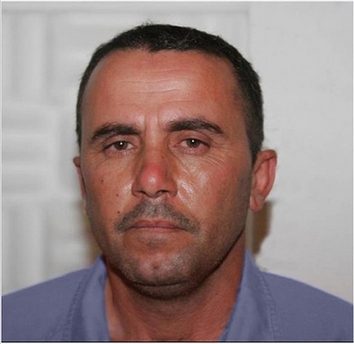US says al-Qaida leader arrested in Iraq
(AP)Updated: 2007-07-19 08:32
BAGHDAD - The US command announced on Wednesday the arrest of an al-Qaida leader it said served as the link between the organization's command in Iraq and Osama bin Laden's inner circle, enabling it to wield considerable influence over the Iraqi group.
 In this photo released by the Department of Defense, Khaled Abdul-Fattah Dawoud Mahmoud al-Mashhadani is seen in this photo after his July 4, 2007, capture by US forces in Mosul, Iraq. [AP]  |
Khaled Abdul-Fattah Dawoud Mahmoud al-Mashhadani was the highest-ranking Iraqi in the al-Qaida in Iraq leadership when he was captured July 4 in Mosul, US military spokesman Brig. Gen. Kevin Bergner said.
Bergner told reporters that al-Mashhadani carried messages from bin Laden, and his deputy Ayman al-Zawahri, to the Egyptian-born head of al-Qaida in Iraq, Abu Ayyub al-Masri.
"There is a clear connection between al-Qaida in Iraq and al-Qaida senior leadership outside Iraq," Bergner said.
He said al-Mashhadani had told interrogators that al-Qaida's global leadership provides "directions, they continue to provide a focus for operations" and "they continue to flow foreign fighters into Iraq, foreign terrorists."
The relationship between bin Laden and the al-Qaida in Iraq leadership has long been the subject of debate. Some private analysts believe the foreign-based leadership plays a minor role in day-to-day operations.
Analysts have also questioned US military assertions that al-Qaida in Iraq is the main threat to US forces here.
Former Pentagon analyst Anthony Cordesman quoted a background brief by US military experts in Iraq this month that said al-Qaida in Iraq was responsible for only 15 percent of the attacks here in the first half of 2007.
Even before al-Mashhadani's arrest, US military officials have insisted that links exist between the local al-Qaida group and the bin Laden clique. From time to time, officials have released captured letters indicating a flow of policy instructions to the group's commanders in Iraq.
Although numerous armed groups operate here, al-Qaida in Iraq's signature attacks - high-profile truck bombings against civilian targets - were largely responsible for unleashing the wave of sectarian slaughter last year that transformed the character of the conflict, US officials say.
"What we've learned from not just from the capture of al-Mashhadani but from other al-Qaida operatives is that there is a flow of strategic directions of prioritization, of messaging and other guidance that comes from al-Qaida senior leadership to the al-Qaida in Iraq leadership," Bergner said.
Al-Qaida in Iraq was proclaimed in 2004 by Jordanian-born Abu Musab al-Zarqawi. He led a group called Tawhid and Jihad, responsible for the beheading of several foreign hostages, whose final moments were captured on videotapes provided to Arab television stations.
Al-Zarqawi posted Web statements declaring his allegiance to bin Laden and began using the name of al-Qaida in Iraq. Al-Zarqawi was killed in a US airstrike in Diyala province in June 2006 and was replaced by al-Masri.
Although al-Qaida in Iraq's rank-and-file are mostly Iraqis, the Iraqi group's top leadership is dominated by foreigners, Bergner said. That includes al-Masri, who joined an al-Qaida forerunner in Egypt in the 1980s and later helped train fighters who drove the Soviet army from Afghanistan.
Pointing to the foreign influence within al-Qaida in Iraq could undermine support for the organization among nationalistically minded Iraqis, including some in insurgent groups that have broken with al-Qaida.
In an effort to give al-Qaida an Iraqi face, Bergner said al-Mashhadani and al-Masri established a front organization known as the Islamic State of Iraq, which the general described as "a virtual organization in cyberspace."
In Web postings, the Islamic State of Iraq has identified its leader as Abu Omar al-Baghdadi, a name indicating Iraqi origin, with the Egyptian al-Masri as minister of war. There are no known photos of al-Baghdadi.
Bergner said al-Mashhadani had told interrogators that al-Baghdadi is a "fictional role" created by al-Masri and that an actor with an Iraqi accent is used for audio recordings of speeches posted on the Web.
"In his words, the Islamic State of Iraq is a front organization that masks the foreign influence and leadership within al-Qaida in Iraq in an attempt to put an Iraqi face on the leadership of al-Qaida in Iraq," Bergner said.
Proclamation of the Islamic State is widely seen as a blunder by al-Qaida because it alienated independently minded insurgent groups that opposed the religious zealots' goal of an Islamic caliphate.
Fearing they would be marginalized by al-Qaida, Sunni sheiks and insurgent leaders began turning against the terror movement, in some cases cooperating with US forces, notably in Anbar province.
Also Wednesday, the US military said three American soldiers were killed the day before in separate bombings in the capital. Two were killed in west Baghdad and another died in east Baghdad, the military said.
Four other Americans were wounded in the east Baghdad blast, the command said. Two insurgents responsible for the attack were identified, engaged and killed, the statement added.
At least 12 people were killed Wednesday in a series of bombings in mostly Shiite areas of eastern Baghdad. Seven of them died in two back-to-back bombings near a gas station in the Amin district, police said.
Eight civilians were killed when gunmen opened fire in the city of Khalis, a Shiite enclave in a mostly Sunni area 50 miles north of Baghdad, police said.
All the police spoke on condition of anonymity because they were not supposed to release the information.
|
|
|
||
|
||
|
|